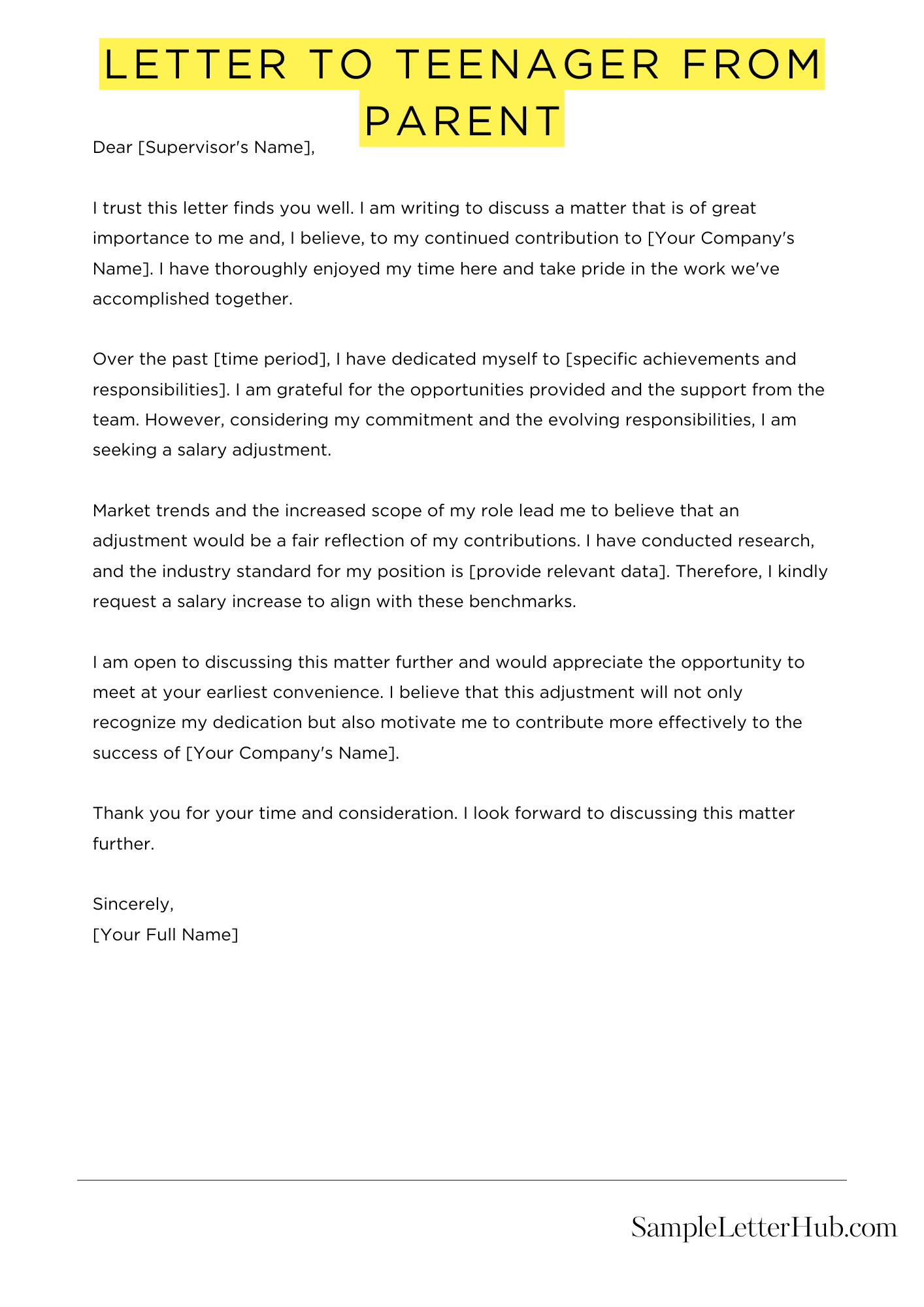Letter To Teenager From Parent is a letter that a parent writes to their teenage child. It is a way for parents to communicate with their teenagers about important topics, such as their values, expectations, and hopes for the future.
In this blog article, we will share templates, examples, and samples of Letter To Teenager From Parent. These letters can be used as a starting point for parents who are struggling to write a letter to their teenager.
We hope that these letters will help parents to communicate with their teenagers in a meaningful way.
A Letter to My Teenage Child
My Dearest [Child’s Name],
As you embark on this exciting chapter of your life, I want to share some thoughts and advice that I hope will guide you along the way.
Remember that you are capable of great things. Believe in yourself and your abilities, and never let anyone dim your light. Embrace challenges as opportunities for growth, and learn from both your successes and setbacks.
Surround yourself with positive influences. Choose friends who uplift you and inspire you to be your best self. Seek out mentors and role models who can provide guidance and support.
Be kind to yourself and others. Treat everyone with respect, regardless of their differences. Remember that words and actions have consequences, and strive to make a positive impact on the world.
Don’t be afraid to ask for help when you need it. We are here for you every step of the way, and we want to see you succeed.
Embrace the present moment. Don’t dwell on the past or worry excessively about the future. Live in the now and make the most of every opportunity.
Remember that you are loved unconditionally. We are proud of the young adult you are becoming, and we will always be there to support you.
As you navigate the complexities of adolescence, know that you are not alone. We are here to listen, offer advice, and provide a safe and loving home.
With love and unwavering support,
[Your Name]

How to Write a Letter to a Teenager From a Parent
1. Start with a Salutation
Begin your letter with a salutation, such as “Dear [Teenager’s name]” or “My Dearest [Teenager’s nickname]”. This salutation will help to set a warm and personal tone for your letter.
2. State Your Purpose
In the first paragraph of your letter, state your purpose for writing. Are you writing to express your love and support? To share some news? To give some advice? Once you know your purpose, you can tailor the rest of your letter accordingly.
3. Be Specific and Detailed
When you’re writing to a teenager, it’s important to be specific and detailed. Don’t just say “I’m proud of you.” Instead, tell your teenager what you’re proud of them for. Don’t just say “I love you.” Tell your teenager why you love them. The more specific and detailed you are, the more your teenager will appreciate your letter.
4. Use Positive Language
When you’re writing to a teenager, it’s important to use positive language. Avoid using negative words or phrases, such as “don’t” or “can’t.” Instead, focus on the positive aspects of your teenager’s life. Tell them what you’re proud of them for, what you love about them, and what you’re looking forward to in their future.
5. End with a Call to Action
In the last paragraph of your letter, end with a call to action. This could be something as simple as asking your teenager to call you or write back to you. It could also be something more specific, such as asking them to help you with a project or to volunteer for a cause that you care about.
6. Proofread Your Letter
Before you send your letter, take some time to proofread it. Make sure there are no errors in grammar or spelling. You should also make sure that the tone of your letter is appropriate and that the content is clear and concise.
7. Send Your Letter
Once you’re satisfied with your letter, send it to your teenager. You can mail it, email it, or even hand-deliver it. No matter how you send it, make sure that your teenager knows that you love them and that you’re always there for them.
FAQs about Letter To Teenager From Parent
What are some tips for writing a letter to a teenager?
When writing a letter to a teenager, it is important to be mindful of their age and maturity level. Use language that is appropriate for their age and understanding. Be clear and concise in your writing, and avoid using jargon or technical terms that they may not understand. It is also important to be respectful of their privacy and not share personal information with others without their consent.
What should I include in a letter to my teenager?
The content of your letter will vary depending on the purpose of the letter. However, there are some general things that you may want to include, such as:
- An expression of love and support
- An update on your life
- Advice or guidance on a particular topic
- A request for their help or support
- A reminder of an upcoming event or deadline
How can I make my letter more personal?
To make your letter more personal, you can include specific details about your teenager’s life. For example, you could mention something that they are interested in, or a recent accomplishment that they have achieved. You can also use personal anecdotes or stories to illustrate your points.
How often should I write to my teenager?
The frequency with which you write to your teenager will depend on a number of factors, such as their age, maturity level, and how often you see them in person. Some parents choose to write to their teenagers once a week, while others write less frequently. There is no right or wrong answer, so it is important to find a schedule that works for you and your teenager.
What are some common mistakes to avoid when writing to a teenager?
Some common mistakes to avoid when writing to a teenager include:
- Being too preachy or judgmental
- Using language that is too formal or condescending
- Ignoring their feelings or concerns
- Not being honest or open with them
- Sharing personal information with others without their consent

